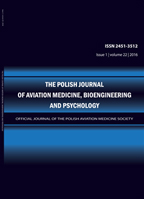2023, Volume 29, Issue 2
NEUTROPHIL GELATINASE-ASSOCIATED LIPOCALIN (NGAL) NOVEL DIAGNOSTIC BIOMARKER OF SEPSIS AND KIDNEY INJURY
AGNIESZKA PODGÓRSKA1, GRZEGORZ KADE2, JANUSZ HAŁKA1
-------------------------------------------------------------------------------------------------
1Clinical Hospital of the Ministry of Inte rnal Affairs and Administration with the Warmia-Mazury Oncology Centre in Olsztyn
2Military Institute of Aviation Medicine
Autor korenspondencyjny: AGNIESZKA PODGÓRSKA; Clinical Hospital of the Ministry of Inte rnal Affairs and Administration with the Warmia-Mazury Oncology Centre in Olsztyn; email: ag.podgorska95@gmail.com
Full text
Streszczenie
Abstract: Neutrophil gelatinase-associated lipocalin (NGAL) is a marker of cellular stress, released from various tissues as a result of neutrophil activation. According to literature data, the detection of NGAL is applicable in cardiological conditions, metabolic disorders such as diabetes or dyslipidemia. Moreover, NGAL is recognised as one of the biomarkers of sepsis. Up to 70% of acute kidney injury (AKI) cases may be related to the development of sepsis. Renal tissue injury associated with inflammation, hypoxia or exposure to toxins leads to an increase in plasma NGAL concentration earlier than other commonly used biochemical markers, even as soon as two hours after injury. Studies have demonstrated the utility of NGAL in early diagnosis of AKI, prediction of chronic kidney disease progression, and assessment of graft function following kidney transplantation. Aviators exposed to hypobaric hypoxia, i.e. high altitude hypoxia, are at risk of injury to several organs, including the kidneys. Novel biomarkers can indicate structural kidney damage before renal function deteriorates. The use of NGAL to identify specific sites of renal tissue injury represents an additional area of investigation, as well as a potential target for therapeutic intervention. The aim of the study is to review the current medical knowledge regarding NGAL biomarker, with particular emphasis on its use in the diagnosis of kidney injury and sepsis.
Słowa kluczowe
NGAL, biomarker, kidney injury, sepsis
